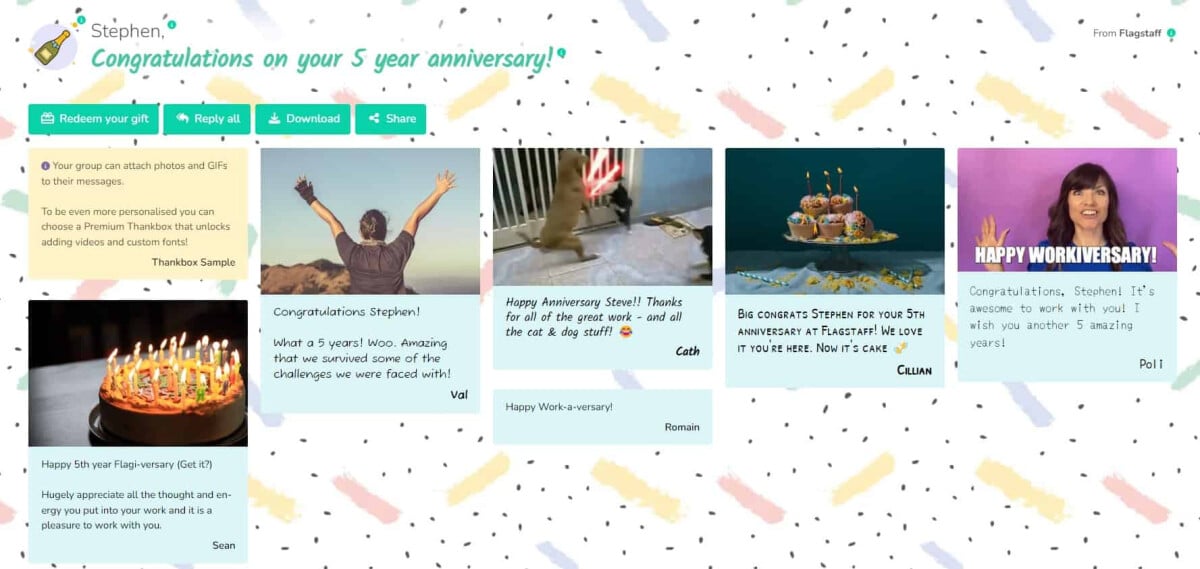What Is Talent Development? Here’s Everything You Need to Know


Talent development—sounds a bit fancy, doesn’t it? But really, it’s like Paul Hollywood and Prue Leith guiding the bakers each week—helping them improve while enjoying some tasty cakes along the way.
Talent development is all about helping your team grow and become the best versions of themselves. It’s a great way to attract top talent—after all, who wouldn’t want to work for a company that’s committed to their future?
Whether you’re running a small business or a big corporation, talent development turns good employees into great ones. And the best part? It doesn’t have to be complicated or cost a fortune.
Join Thankbox as we explore the ins and outs of talent development, creating workplaces where people can thrive, learn, and unlock their full potential.
Let’s get started!
What exactly is talent development?
Talent development helps your employees succeed by boosting their soft and hard skills, knowledge, and abilities. It’s a strategic approach focused on supporting their potential and uncovering hidden talent.
Think of it as a long-term investment in your people. Whether through training, a succession plan, coaching, or hands-on experience, talent development ensures your coworkers are constantly improving and ready to tackle new challenges.
Ultimately, it’s a win-win situation. Employees feel appreciated and experience a boost in motivation, while businesses gain a more capable workforce that drives growth and innovation.
What’s the difference between talent development and talent management?

You might be wondering, “Aren’t talent development and talent management the same thing?” While they sound similar, they both serve different purposes. Talent development focusses on helping individuals grow by building their skills and advancing their careers.
On the other hand, talent management covers the entire process of attracting, hiring, onboarding, and retaining staff. It’s about finding the right people for the right roles, while talent development helps those people grow once they’re in place.
What are the benefits of talent development?
Now that we’ve covered the basics, let’s take a look at the benefits of talent development:
Keeps your employees happy: Investing in your team’s future creates a happier workplace. When employees feel appreciated and valued in their roles, they’re much more likely to stick around.
BUSINESS_CTA
Better performance: When people develop their skills, they get better at what they do—and fast, leading to a boost in productivity, better results, and a team that’s firing on all cylinders.
Attracts top talent: Let’s face it—people want to work for companies that invest in their growth. When your business is known for developing talent, it becomes a recruitment method that works, drawing in top candidates who are eager to grow.
Creates future leaders: Developing your team’s leadership competencies means you’ll have strong, capable people ready to step up when needed. It’s like building a leadership pipeline to keep things running smoothly long-term.
How to fine-tune your talent development strategy
Let’s dive into some practical steps to fine-tune your talent development strategy. Remember, it doesn’t have to be complicated—these simple strategies can make a big difference:

1. Define your company goals
Before you get the ball rolling, take some time to think about where you want your business to be in the next few years and the skills needed to get there. Clear goals allow you to align your talent development strategy with your company’s long-term vision.
Whether it’s driving innovation, enhancing customer service, or building strong leadership, defining these goals will give your team a clear sense of purpose and direction.
2. Provide regular training and workshops
Offering regular training sessions—SMART leadership goals, hands-on workshops, or creative problem-solving—gives your employees the tools to grow. Plus, it keeps your business competitive as your team is always up to date with the latest skills and ideas.
3. Encourage mentorship programmes
Pairing new starters with experienced mentors helps them learn faster, build confidence, and develop in-demand skills. Mentors offer valuable insights and guidance based on their own experiences, which can be incredibly helpful in challenging scenarios.
Mentorship doesn’t just benefit the mentee—it creates a two-way relationship where mentors improve by sharing their knowledge and skills. Plus, it’s the perfect way to build stronger connections within your team.
4. Recognise and reward progress
Don’t forget to celebrate your employees’ achievements. Whether through promotions, bonuses, or even a simple shout-out, showing appreciation helps motivate and inspire your team. And what better way to do it than with Thankbox?
Thankbox is the go-to platform for celebrating work anniversaries, employee milestones, or saying “Thank you” for a job well done. We allow your whole team to send personalised messages in a single online card, even if you’re all spread out across the globe.

It’s more than just a quick message on Slack—it’s about bringing your team closer together. With Thankbox, you can add fun touches like GIFs, video messages, photos, digital gift cards, and even flower deliveries!
Join over 3,000 businesses that use Thankbox and make every achievement extra special.
5. Map out employee development plans
Employee development plans (EDPs) cater to each individual's strengths, goals, and areas for improvement. In simple terms, they provide a clear roadmap, outlining the skills and experiences required for career progression.
To do this effectively, take the time to sit down with each team member and collaborate on designing their plan. It’s a great way to show your commitment to their future success by providing regular feedback and support.
6. Spot opportunities for upskilling and reskilling
As your business evolves, so should your team’s skill sets. That’s where upskilling and reskilling come in. Upskilling helps employees build on their existing abilities, while reskilling equips them with new skills to take on different roles and responsibilities.
By identifying these opportunities, you can more easily fill skill gaps, boost overall productivity, and encourage a culture of continuous learning within your team.
BUSINESS_CTA
Wrapping up
Talent development isn’t just a fancy buzzword—it’s an essential part of a thriving and motivated team. By focusing on growth, achievements, and opening the doors to opportunities, you create a workplace where employees are excited about their future.
Want to show your team some well-deserved appreciation? Create a Thankbox today and bring your team closer together.
Images: Cover | Happy colleagues | Businesswomen sitting on chairs





